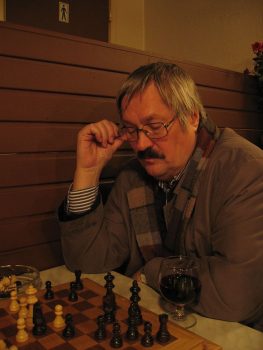Tritonus
Issue 3/1976 | Archives online, Fiction, poetry

Pentti Saaritsa playing chess. Photo by Otso Kantokorpi, 2006.
Pentti Saaritsa (born 1941), author of six collections of poetry, is one of Finland’s leading left-wing poets, who writes about a wide range of individual and social themes. An outstanding translator, he has had a major role in making Latin American literature, especially the work of Miguel Angel Asturias and Pablo Neruda, known and admired in Finland. He also translates from Russian. The first five poems below have been taken from his latest collection Tritonus (‘Tritone’, Kirjayhtymä 1976), and the last two from his Syksyn runot (‘Autumn poems’, Kirjayhtymä 1973). His poems have appeared in various anthologies abroad and are now being translated into Swedish, English and French. Pentti Saaritsa is a member of the editiorial board of Books from Finland.
![]()
1
From the bowels of each apartment house
always that one unknown sound is borne.
Sometimes like drily dripping water, sometimes
as a stone might bite a lump out of itself,
Or a child awake in the dark might learn the word hair.
And a tenant listens, makes a note of it
perhaps to punctuate the interrupted writing of his consciousness
when it makes him restless:
What now, again so soon, is it coming from me
or from the dead building.
An alarm-bell. Did anyone else hear?
Pressing the ear to the radiator does not help, it is not
coming from where it is listened for.
But from the dim stairs of hearing itself,
from the banisters of doubt and uncertainty
behind which the forebodings of new houses loom.
2
If the name of the piece is Nocturne,
build the night round it yourself,
there is nothing else.
If the name of the poem is The Son of Day,
you must be it, every one
who reads it.
Through your tears
the smiling girl in the drawing emerges most sharply.
Nor are you spared a single sorrow or joy either
though you were to read, see or hear nothing.
Everything in you is ready,
love and art born of a lack of it,
reason and the world’s folly born of a lack of it.
Choose whichever of them you like, always unknown beforehand,
do it, try to get it done.
Ask and move. Night is always sure to come.
Bringing knowledge with it.
3
So many, so many notes,
so many rooms
in the two-footed house.
Someone in me sometimes gets up, opens the door.
Makes as if to leave, hums its sick note.
Just as today that eight-year-old who by accident
wrenched his comrade’s hand out of joint
and then wept as the other second-formers stared.
I did not let him go, not even him.
I need all my voice. Each chord.
It is not ready yet.
A new room is being prepared. I sit in the middle of it,
in a wicker chair, my ear alert.
From the previous note to this one is a clear tritone. On a distant
bugle against a windy forest of strings. I change
so powerfully that my house shakes.
The children in its rooms listen, prematurely old,
a little bit frightened.
4
What power do you live by, traveller.
You see the incredible yellow breakdown van in the sunlight of the railway yard.
By its power, now that joy weighs on your midriff?
No, by the power of the sun, then?
The spring sun? Or the sun generally?
There is a power from whose power you get so much
that what you do is sometimes sheer restraint
as though you needed a brake down heaven’s hill.
The yellow side of the van, its light, and the same light
on the face of a girl wellnigh bursting with vitality
in the platform crowd, and the same light at the zenith of your brain
was today the power
which trembling you touched like the hem of the Enlightened.
5
Snow, the weird,
boreal spectre that overturns
the laws of light and gravity.
How could any Ecuadorean
ever believe
that some March morning when fresh snow has fallen
the earth flies three hundred feet into the air
and the trees grope, grope
at the sky with their helpless roots
their heads somehow crammed earthward
full of the soil’s dreams.
Translated by Keith Bosley
6
One milky morning at the end of summer
I killed that long black viper
nesting in the middle of the sauna path.
And now, through this cello in Bartok’s quartet
It returned calmly to me.
7 Theory
Now
it takes off
the landscape becomes a map
the houses shrink
humans
no longer distinguishable
only the wing
remains close.
Translated by Grazyna Dzierzko and Roger Connah
No comments for this entry yet
